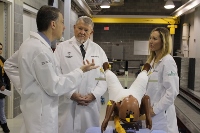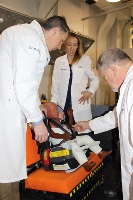
A research partnership between McLaren Flint’s Orthopedic Residency Program and Kettering University may impact new federal child car seat guidelines coming out in fall 2018. Two variables are making the crash testing unique. One, the child size test dummies are being casted, and two, near side impact crash testing is taking place.
The problem the research is addressing is there are currently no approved car seats on the market for children who have to be placed in a spica cast (also called a hip spica cast or body cast) which immobilizes the hips and thighs so that bones or tendons can heal properly. In general, this type of cast is used for children age six months to five years who have hip dysplasia or a broken thigh bone. In order to be safe, parents have to either purchase a special harness to secure the child while laying down in the back seat, or use an ambulance for transport. This can add up as several follow up appointments are needed during the healing process. Angela Collins, MD, PhD, second year orthopedic resident at McLaren Flint, has become a key person involved in the process. She took on the project initiated by Jeff Peck, MD, a chief resident in the program in 2017. Collins credits fellow second year resident Sean Caskey, DO, for laying the ground work for testing to begin which included grant funding from the McLaren Flint Foundation.
“Kettering tested a special car seat made for children with spica casts called a Hippo, about 10 years ago but that seat is no longer available,” states Collins. “We are revisiting the testing using commercially available seats as well as a new seat design for spica casted children. We are also looking at near side impact crashes, this would be the car door right next to the child. As far as we know we are the only lab testing casted crash test dummies. There are no good evidence based guidelines out for children with these types of casts so our hope is that we can provide them. For all car seats, frontal impact testing is required using uncasted dummies but side impact testing is not required at this time. We are looking at both side and frontal testing of casted dummies.”
Governing bodies require residency programs to include research to provide a more well-rounded education. The requirement for McLaren Flint’s orthopedic residents is four months of dedicated research. Kettering University is the hospital’s research partner institution. Angela experienced research projects in the past while earning her PhD and was very excited to have the dedicated research time during her orthopedic residency to pursue something with important clinical implications.
“Vehicle crashes are both an engineering and medical problem,” states Patrick Atkinson, PhD, professor mechanical engineering at Kettering University. “Having the engineer and physician in the same room helps us learn how we can make vehicle safety devices even more protective of the human body. In my role, I want to prevent injuries from happening in the first place. I think the partnership between Kettering and McLaren’s orthopedic residency program is one of the best in Flint.”
Second year resident Charles Frank, MD, is also helping doctors Collins and Atkinson perform the analysis. The goal is to have the test results published by summer. This will likely get the attention of car seat experts since the National Highway Traffic Safety Administration is putting new federal car seat standards in place this coming October.
